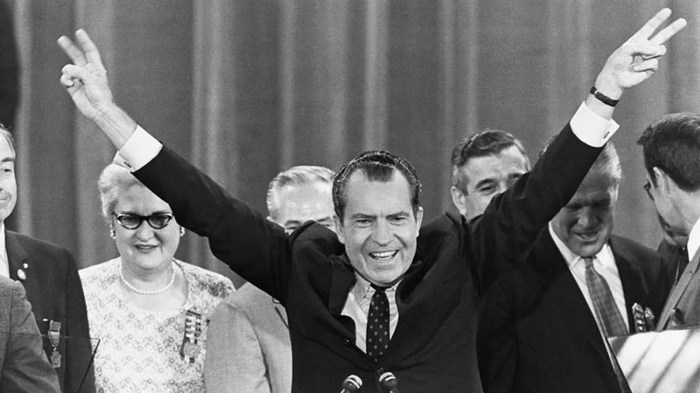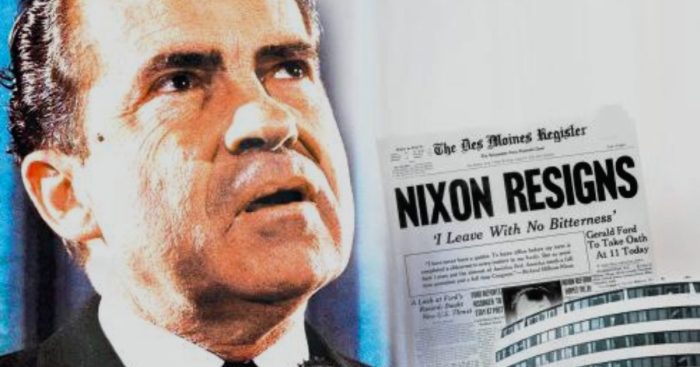President Ford’s method of moving beyond the Watergate scandal involved a multifaceted approach that aimed to restore public trust, shift the national focus, and establish a legacy of accomplishment. This article analyzes Ford’s strategies, their consequences, and their impact on American politics and society.
Pardon of Richard Nixon
President Ford’s decision to pardon former President Richard Nixon on September 8, 1974, was a controversial act that had a profound impact on American politics.
Ford’s motivations for the pardon were complex. He believed that the country needed to move beyond the Watergate scandal and that a pardon would help to heal the nation. He was also concerned that Nixon would be convicted and sent to prison, which he felt would be a humiliating end to Nixon’s career.
The pardon had immediate and long-term consequences. It sparked widespread public outrage and led to a decline in Ford’s popularity. It also damaged the Republican Party’s reputation and contributed to the Democratic Party’s victory in the 1976 presidential election.
The pardon also had a lasting impact on Ford’s presidency. It made it difficult for him to pass legislation and tarnished his reputation as a leader.
Rebuilding Public Trust

After the Watergate scandal, President Ford realized that he needed to rebuild public trust in the government. He implemented a number of strategies and initiatives to achieve this goal.
One of Ford’s most important initiatives was to promote transparency and accountability. He established the Office of Independent Counsel to investigate allegations of wrongdoing by government officials. He also signed the Government in the Sunshine Act, which required government meetings to be open to the public.
Ford’s efforts to rebuild public trust were partially successful. The public’s trust in the government increased during his presidency, but it did not fully recover until after the Watergate scandal was over.
Focus on Domestic Issues

After the Watergate scandal, President Ford shifted the national focus away from Watergate and towards domestic concerns. He believed that the country needed to focus on its economic problems and other pressing issues.
Ford’s domestic policies were largely conservative. He cut taxes and reduced government spending. He also deregulated the economy and promoted free trade.
Ford’s domestic policies had a mixed impact on the economy and society. The economy grew during his presidency, but inflation remained high. The gap between the rich and the poor also widened.
Foreign Policy Initiatives: President Ford’s Method Of Moving Beyond The Watergate Scandal

President Ford’s foreign policy agenda was focused on three main priorities: maintaining peace during the Cold War, promoting détente with the Soviet Union, and strengthening alliances with Western Europe and Japan.
Ford’s most significant foreign policy achievement was the Helsinki Accords, which were signed in 1975. The accords helped to reduce tensions between the United States and the Soviet Union and paved the way for future arms control agreements.
Ford also made progress in promoting détente with the Soviet Union. He met with Soviet leader Leonid Brezhnev on several occasions and the two leaders signed a number of agreements on arms control and other issues.
Ford also strengthened alliances with Western Europe and Japan. He visited both regions on several occasions and he worked to improve economic and security cooperation.
Legacy and Impact

President Ford’s legacy is mixed. He is remembered for his handling of the Watergate scandal, but he is also criticized for his domestic policies and his foreign policy initiatives.
Ford’s handling of the Watergate scandal was widely praised. He pardoned Nixon, but he also appointed a special prosecutor to investigate the scandal and he made sure that Nixon was held accountable for his actions.
Ford’s domestic policies were largely conservative. He cut taxes and reduced government spending. He also deregulated the economy and promoted free trade. These policies had a mixed impact on the economy and society. The economy grew during his presidency, but inflation remained high.
The gap between the rich and the poor also widened.
Ford’s foreign policy initiatives were focused on maintaining peace during the Cold War, promoting détente with the Soviet Union, and strengthening alliances with Western Europe and Japan. He made progress on all three of these fronts, but he was also criticized for his handling of the Vietnam War.
Overall, President Ford’s legacy is mixed. He is remembered for his handling of the Watergate scandal, but he is also criticized for his domestic policies and his foreign policy initiatives.
FAQ Overview
What were the reasons behind President Ford’s decision to pardon Nixon?
Ford pardoned Nixon to prevent further division and disruption in the country, and to allow the nation to move forward from the scandal.
How did Ford attempt to rebuild public trust after Watergate?
Ford implemented initiatives to promote transparency and accountability, including regular press conferences and the creation of the Office of Management and Budget.
What were the key domestic policies undertaken by Ford’s administration?
Ford’s domestic policies focused on economic recovery, energy independence, and healthcare reform, including the creation of the Employee Retirement Income Security Act (ERISA).